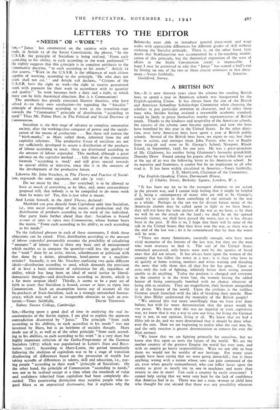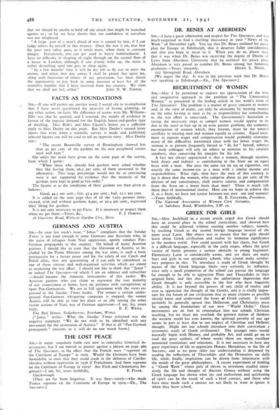A BRITISH BOY siR,—It is now thirteen years since the
scheme for sending British boys to spend a year in American schools was inaugurated by the English-speaking Union. It has always been the aim of the British and American Schoolboy Scholarships Committee when choosing the scholars to pay particular attention to character, and to select those boys who, besides having attained a reasonable academic standard, would be likely to prove themselves worthy representatives of British youth. Thanks to the kindness and hospitality of the American schools, the success of the scheme soon became apparent, and now 16o boys have benefited by this year in the United States. In the other direc- tion, over forty American boys have spent a year at British public schools. Several of the British boys have, we regret to say, lost their lives in action, and amongst them John Parish, who was at Rugby from 1934-38 and went to St. George's School, Newport, Rhode Island, in September, 1938, for one year. He was a great-grandson of Mr. Gladstone, his mother being Gladstone's favourite grandchild. Dorothy Drew. Found among his papers after he was killed this year at the age of 20 was the following letter to his American school. In its maturity and frankness, it cannot but be an inspiration to all who read it. It has been widely circulated in America.—Yours faithfully, J. E. MAITLAND, Chairman of the Committee.
The English-Speaking Union, Dartmouth House, 37 Charles Street, Berkeley Square, London, W. r.
" It has been my lot to be the youngest alumnus to see action in the present war, and I cannot help feeling that it might be helpful if I, being a .zontemporary of many who are still at St. George's, could try to convey to them something of our attitude to the war as a whole. Perhaps in the not too far distant future many of the American alumni may be called upon to fight as we have been ; they will not have the same picture of the war as we have, as by then we will be on the attack on the land ; we shall be on the uproad towards victory, we shall have passed the worst, just as it has always been in the past. If this is so, I hope that there will be none of the talk in the United States that they have won the war, as there was at the end of the last war ; let it be remembered that by then the worst will be over.
" There are many Americans, naturally enough, who have most vivid memories of the horrors of the last war, but they are the men who went overseas to find it. The soil of the United States remained unscarred, only hearts were torn by the agonies of loved ones that did not return. It has always been upon the women of the country that has fallen the worst in a war ; it is they who have to sit quietly at home waiting, mothers and wives waiting and dreading the news that tells them that all they live for has gone. Upon us rests only the task of fighting, infinitely better than sitting around unable to do anything. Today the position is changed and everyone in the country is in the front line, the women having the added horror of being continually bombed with no chance whatever of being able to retaliate. They are magnificent, their heroism unequalled in all the history of the world. Upon the civilians is the ruthless German attack launched with the idea of breaking their morale. How little does Hitler understand the mentality of the British people!
" We entered this war more 'unwillingly than we have ever done before, but with far more determination that the peace would be our peace. We knew that this was no imperial or even capitalistic war, we knew that it was a war to save our lives, for living the German way is not, in our opinion, living at all. We knew that we had a filthy job to do, and we were determined that it should be done what- ever the cost. Now we are beginning to realise what the cost may be, and the only reaction is greater determination to remove for ever the Nazi menace.
" We know that we are fighting primarily for ourselves, but we know also that upon us rests the future of the world. We are the mother country of the greatest Empire the world has ever seen, and with an empire go heavy responsibilities. Were we not able to bear them we would not be worthy of our heritage. For many years people have been saying that we were going down-hill ; but is there anything wrong with a nation whose sons can gain command of the air, even when greatly outnumbered, who can inflict losses upon the enemy as great as nearly ten to one in machines and more than twenty to one in men? Can such a country be easily overcome? I cannot help saying that we were very hurt by the lack of confidence that America had in us. There was not a man, woman or child here who thought for one second that there was any possibility whatever that we should be unable to hold off any attack that might be launched against us ; so far we have shown that our confidence in ourselves was not misplaced.
"A large part of a man's dread of war is caused by fear, if I can judge others by myself in this respect. Once the war is on, that fear for your own safety goes, as it needs must, when there is constant danger. Fortunately, you can get used to heavy bombardment. I have no difficulty in sleeping all night through on the second floor of a house in London,. although, if one should wake up, the .noise is rather disturbing until one gets to sleep again.
" In a few months' time it will be my job to fly out to meet the enemy, and when that day comes I shall be proud that upon me, along with thousands of others of my generation, has been thrust the opportunity to pay back in some measure at least for all ‘the countless benefits that I have received from my country. We trust



























 Previous page
Previous page